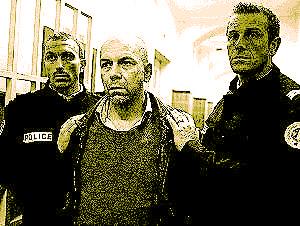Film Review
It was the most notorious, most publicised miscarriage of justice to
have taken place in France since the end of the Second World War.
Although they were ultimately acquitted, six men and women had their
lives turned inside out as they fell victim of a flawed judicial
process that allowed them to be indicted solely on the evidence of an
unreliable witness and held in custody without trial or the chance of
appeal for up to three years. They were the victims not only of
an imperfect legal system but also a manic feeding frenzy in the
national media, which sought to profit from the public outrage over
paedophilia in the aftermath of the Marc Dutroux affair. The
hysteria was not unlike that surrounding the Salem witch trials of the
17th century, and the injustices committed were almost as great.
In his book 'Chronicle of my judiciary error', a hardworking
bailiff and family man named Alain Marécaux gives a deeply
moving account of one of those on the receiving end of this
catastrophic failure of justice. Director Vincent Garenq was
moved to tears when he read the book and was prompted to turn it into a
hard-hitting drama documentary which follows Marécaux on his
horrific descent into Hell. For much of his previous career,
Garenq had devoted himself to making documentaries for French
television, so he was admirably well-placed to deliver an authentic
account of a true story, without the merest fictional
embellishment.
Présumé
coupable makes a stark contrast with Garenq's previous film, the
engaging social comedy
Comme les autres (2008).
It is an engrossing, intensely poignant account of one man's martyrdom
within the machinery of a woefully inadequate system which, when it
goes wrong, goes seriously badly wrong.
The so-called 'Outreau Affair' (named after the small town near
Boulogne in Northern France where the alleged paedophilia incident took place) is now such
a cause célèbre in France that Garenq was wise not to
attempt a broad canvas account of the case. Instead, he goes for
a more intimate study that focuses entirely on the experiences of one
of the victims of the affair, Alain Marécaux. The whole
film is shown from Marécaux's narrow perspective and, as a
result, effectively instils in its spectator his confusion, outrage
and abject desolation as his world literally falls apart in front of
his eyes. This is not a film that will leave you unmoved, and the
likelihood is that it will have you shouting in disgust and horror at
what you see. It's shocking to think that such a Kafkaesque
nightmare could be a reality in 21st century France and you end up
genuinely fearful that the same thing could happen to you.
Apparently all it takes to have your life destroyed is someone prepared
to stand up and lie in court, an inexperienced and credulous magistrate and
a pack of muckraking journalists ready to leap onto the next
bandwagon. Any one of us could be the next John Proctor.
Présumé coupable
is an eye-opening and profoundly disturbing film but what makes it so
particularly absorbing is an astonishing lead performance from Philippe
Torreton. The actor who drew international acclaim in such films
as Bertrand Tavernier's
Capitaine Conan (1996) and
Ça commence aujourd'hui
(1999) has been virtually off the radar for the past decade but here he
makes a remarkable comeback, utterly convincing, devastatingly human, as
the unfortunate Alain Marécaux. A stickler for
authenticity, Torreton not only agreed to have his head shaven, he also
intended to lose fifty kilograms for the scenes in which Marécaux
subjects himself to a 93 day hunger strike. For health reasons,
the actor had to content himself with losing just 27 kilograms, as a
result of which he is totally transformed and is practically reduced to
a barely mobile skeleton. How the 2012 Best Actor César
managed to elude Torreton is a mystery - his portrayal of
Marécaux, an ordinary man driven to the absolute limits of what
flesh and blood can endure, is indescribably moving.
Présumé coupable
cannot fail to leave you stunned not only by the crass ineptitude of
France's judicial system but also by its staggering lack of humanity.
© James Travers 2014
The above content is owned by frenchfilms.org and must not be copied.
Film Synopsis
This film recounts the harrowing exploits of Alain Marécaux,
who, along with his wife and twelve other people, was arrested in 2001
for grotesque paedophilic acts of which he was entirely
blameless. It is the story of one man's descent into Hell as he finds
himself caught up in the workings of an inhuman and uncompromising
judicial system. Alain is the victim of one of the most heinous
miscarriages of justice of our time...
© James Travers
The above content is owned by frenchfilms.org and must not be copied.



